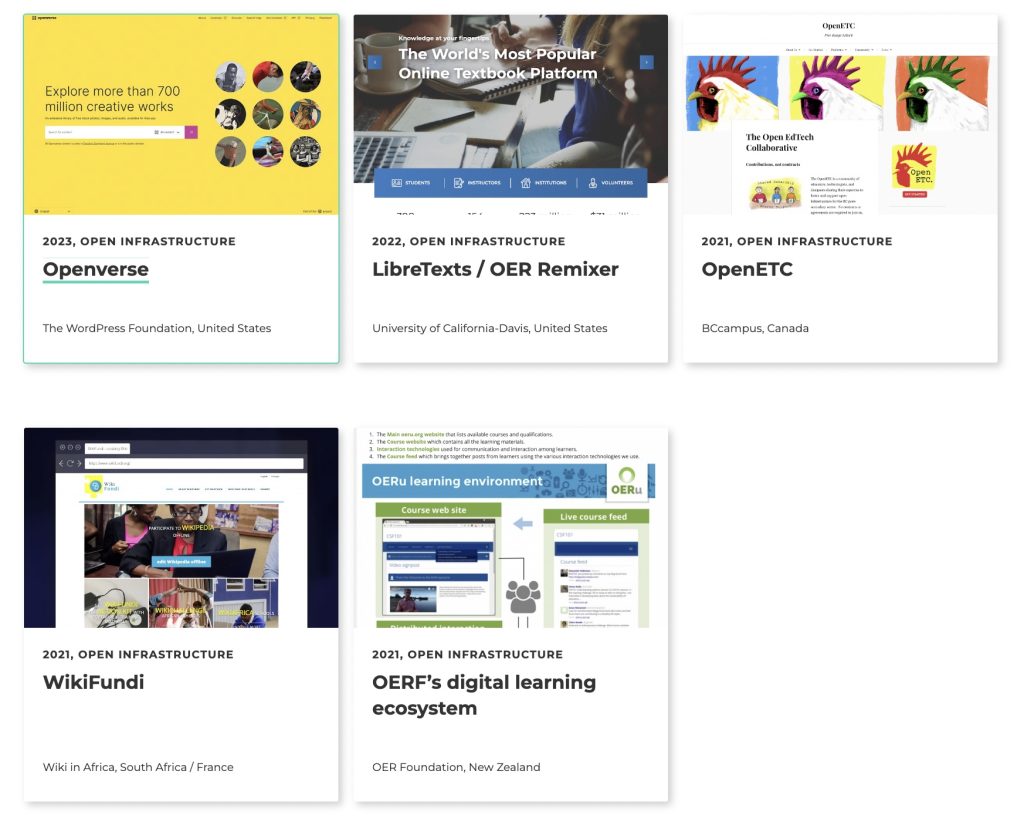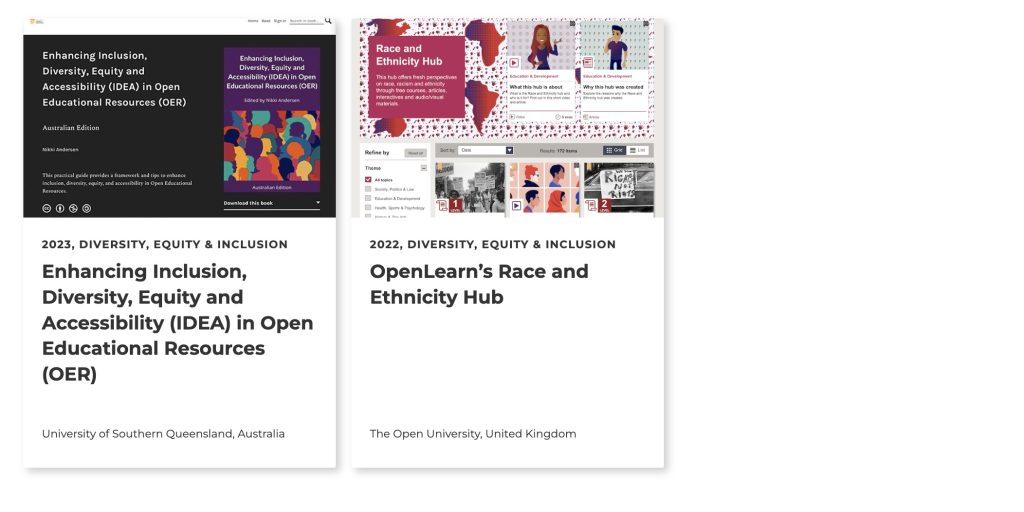Are you starting to think about potential nominations for the 2024 Open Education Awards for Excellence? We open up the process next week and the form is available through June 30. The success of this program depends fully on the actions of people like you who send in nominations. See the nomination guide for helpful information.
We continue a series of posts each week of the nomination period to focus on information about two of the sixteen award categories, including examples of previous awards given in each. We hope this seeds you with ideas of a person or project to consider this year. Last week we focused on the Individual Award for Students and the Open Pedagogy Awards.
Now we look in more detail at the Open Infrastructure Awards and the Special Award for Diversity, Equity and Inclusion. As relatively new categories for the OE Awards, both of these categories demonstrate the program’s flexibility to recognize current trends and issues in open education.
Focus on the Open Infrastructure Award

Obviously openly licensed technology is built into or integral to a majority of projects recognized under the OE Awards program. The creation of the Open Infrastructure Award in 2021 can be seen as an extension of a previous category for Open Tools.
The suggestion to the planning committee for a broader category says much about the evolution of open technologies from tools for specific purposes to more general purpose platforms that not only allow creation and publishing of open education content, but more systemic implementation. This category then aims to highlight such development that not only operates openly, but are also build from open source technologies.
This was clearly demonstrated in the 2021 award for the fully open platform implementation by the OER Foundation, where as nominated, points to it as an “open infrastructure for sustainable OER.” Similarly, in the same year, the award recognized the WikiFundi platform that extends the capacity of open education by providing the experience of using and editing Wikipedia to parts of the world without reliable internet.
Both of these examples are much broader than tools. Making a “hat trick” for 2021, the award went also to British Columbia’s OpenETC, the educational technology co-op approach to making open platforms and community support available to educators at all higher education institutions in the province. This takes the potential of infrastructure beyond just the platforms.
More recent awards to the OER Remixer from LibreTexts (2022) and in 2023 to the Openverse federated search for openly licensed media (the evolution of the original Creative Commons CC Search) provide more examples of the kinds of open infrastructures you might consider for a 2024 nomination.
Give some thought to the range of platforms in your open education practice that enable broad implementation or systemic like services that are built upon open source technologies. Keep in mind to the collaborations and approaches to sharing and providing support for these platforms. What infrastructures come to mind for a 2024 award in this category?
Focus on Diversity, Equity & Inclusion Award

If anything says something how the awards have evolved along side the growth of open education itself from beginnings about tools and content, it is the special award first offered in 2022 for programs that advance inclusion, access, equity, diversity in all aspects of open education, from content to practice to professional/personal development.
In its first year, the 2022 DEI award went to the Race and Ethnicity Hub developed at the Open University and made available to the world through OpenLearn. And demonstrating the Diversity, Equity, and Inclusion is a global effort, the award in 2023 recognized the OER for Enhancing Inclusion, Diversity, Equity and Accessibility (IDEA) in Open Educational Resources (OER) developed by the University of Southern Queensland.
There are so many more resources, programs, and awareness efforts that have been produced since this award has created, that we are anticipating a good number of nominations in this category. Please consider the DEI efforts at your own institution or ones you have seen elsewhere that serve as shining examples of the ways open practices and resources are making a difference in inclusion and expanding diverse participation/representation in open education.
What’s Next?
We hope these newer award categories described in this post generate ideas for you to be considering open infrastructures that enable you open education work as well the inspiring programs and projects that are successfully addressing Diversity, Equity, and Inclusion in open education.
Let’s all together make a lot of work for the review committee, by greatly increasing the number of nominations this year for the 2024 OE Awards. Again, like last year our goal is to share and give credit to all people, projects, and practices represented in the pool of nominations.
Stay tuned for next week’s post that will bring forward details and examples from two more awards categories, or refer to the previous post in this series.
If you have questions or suggestions about the awards, you can follow up with us in discussions below on these categories (and more) from the OE Awards space in OEG Connect.
Reply in OEG Connect
Do you have suggestions or questions about these award categories? We have an open discussion attached to this post.